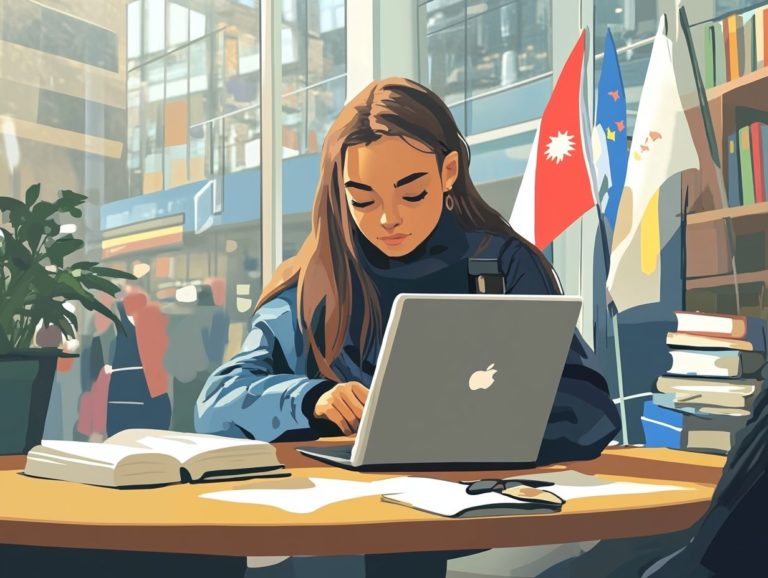What to Know About Studying in Venezuela
Studying in Venezuela presents you with a distinctive combination of quality education, vibrant culture, and affordability. Discover the incredible learning opportunities that await you!
The country has a wide range of schools and universities, allowing you to explore diverse programs at some of its top institutions.
This guide covers essential aspects of studying in Venezuela, including university rankings, tuition costs, visa requirements, and the rich cultural experiences you can expect.
Whether you’re contemplating pursuing a degree or simply curious about the possibilities, explore why Venezuela could be your next academic destination.
Contents
- Key Takeaways:
- Why Choose Venezuela for Higher Education?
- Educational Framework in Venezuela
- Top Universities in Venezuela
- Cost of Studying in Venezuela
- Visa and Immigration Requirements
- Cultural Experience in Venezuela
- Frequently Asked Questions
- Key Things to Know About Studying in Venezuela
- What is the education system like in Venezuela?
- What are the most popular subjects to study in Venezuela?
- What is the cost of studying in Venezuela?
- What are the language requirements for studying in Venezuela?
- Are there any scholarships available for international students in Venezuela?
Key Takeaways:
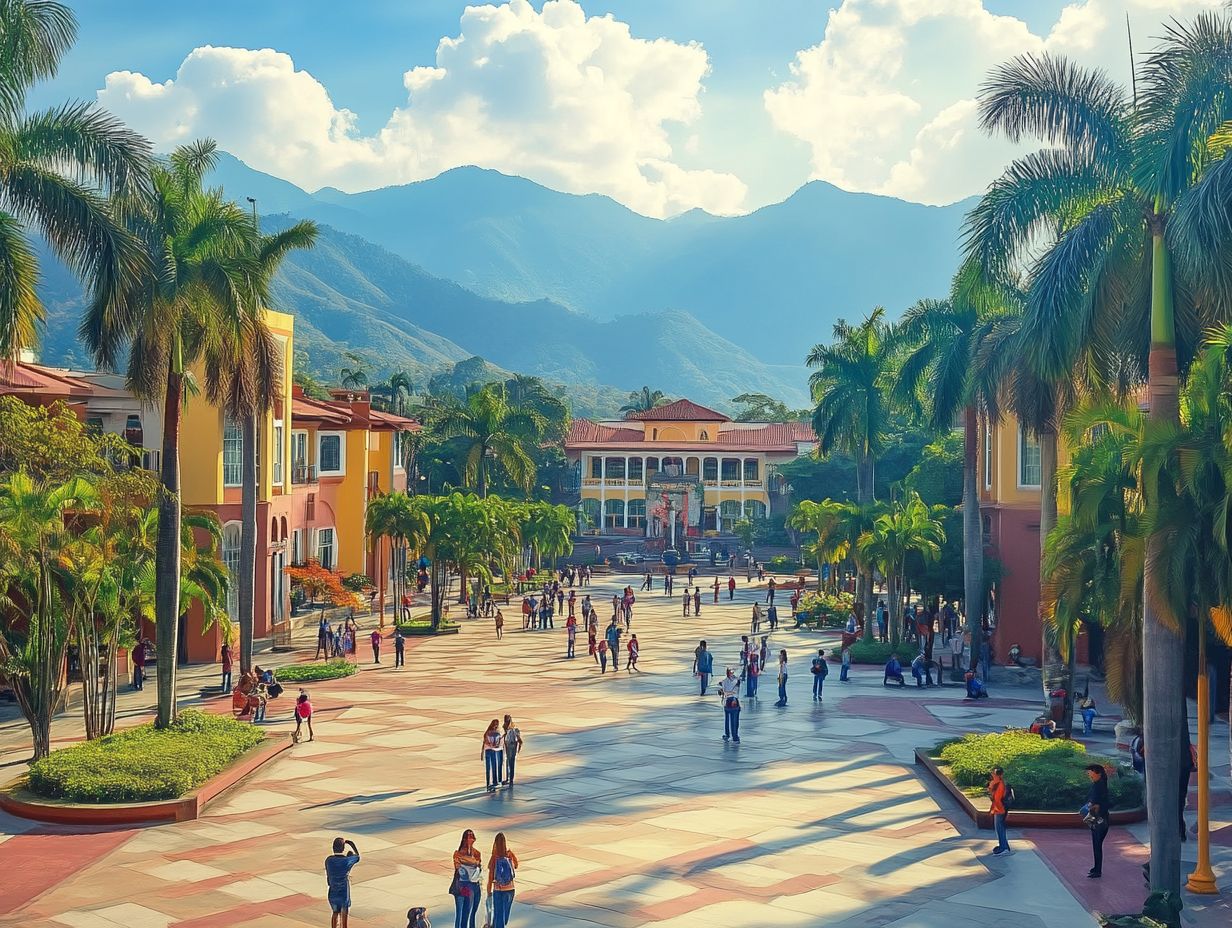
- Experience a unique blend of culture and education by studying in Venezuela, a country known for its vibrant traditions and high-quality higher education opportunities.
- Discover a diverse educational system, from primary to tertiary education, offering a wide range of programs and degrees for students to choose from.
- Affordability is a key factor when considering studying abroad; Venezuela offers a lower cost of living and tuition fees compared to other study destinations, with financial aid options available.
Why Choose Venezuela for Higher Education?
Choosing Venezuela for higher education offers a remarkable opportunity to immerse yourself in a dynamic academic environment while embracing the country s rich cultural heritage. With esteemed institutions like the Central University of Venezuela and the University of the Andes, you can anticipate a well-rounded education that harmonizes the humanities and sciences.
Surrounded by breathtaking natural wonders such as Angel Falls and Canaima National Park, along with the vibrant urban life of Caracas, you ll have the chance to forge meaningful connections with local communities, enriching both your academic journey and cultural experiences.
Educational Framework in Venezuela
The educational framework in Venezuela is structured to guide primary, secondary, and tertiary education. Its aim is to enhance literacy rates and deliver quality education to its youth.
The dedication to promoting academic growth shines through even in the face of considerable economic challenges and budget constraints across numerous institutions.
Overview of Primary, Secondary, and Tertiary Education
The education system is meticulously divided into primary, secondary, and tertiary levels, each playing a pivotal role in shaping overall literacy rates and learning outcomes. The government places significant emphasis on a solid foundation in primary education, followed by a comprehensive secondary education that prepares you for higher learning and fosters personal development.
In primary education, the curriculum focuses on essential literacy and numeracy skills, ensuring young learners are equipped to navigate the complexities of the world. Progressing into secondary education, you ll encounter a more expansive curriculum that emphasizes critical thinking, as well as the sciences and arts, fundamental for academic and personal growth.
However, challenges persist, particularly in resource allocation and access to quality materials, raising concerns among local schools. The National Assembly plays a crucial role in shaping education policy, with the potential to address these challenges and enhance the educational framework.
This ensures that you and your peers have the opportunity to thrive both academically and socially as you prepare for tertiary education, which includes colleges and universities.
Top Universities in Venezuela
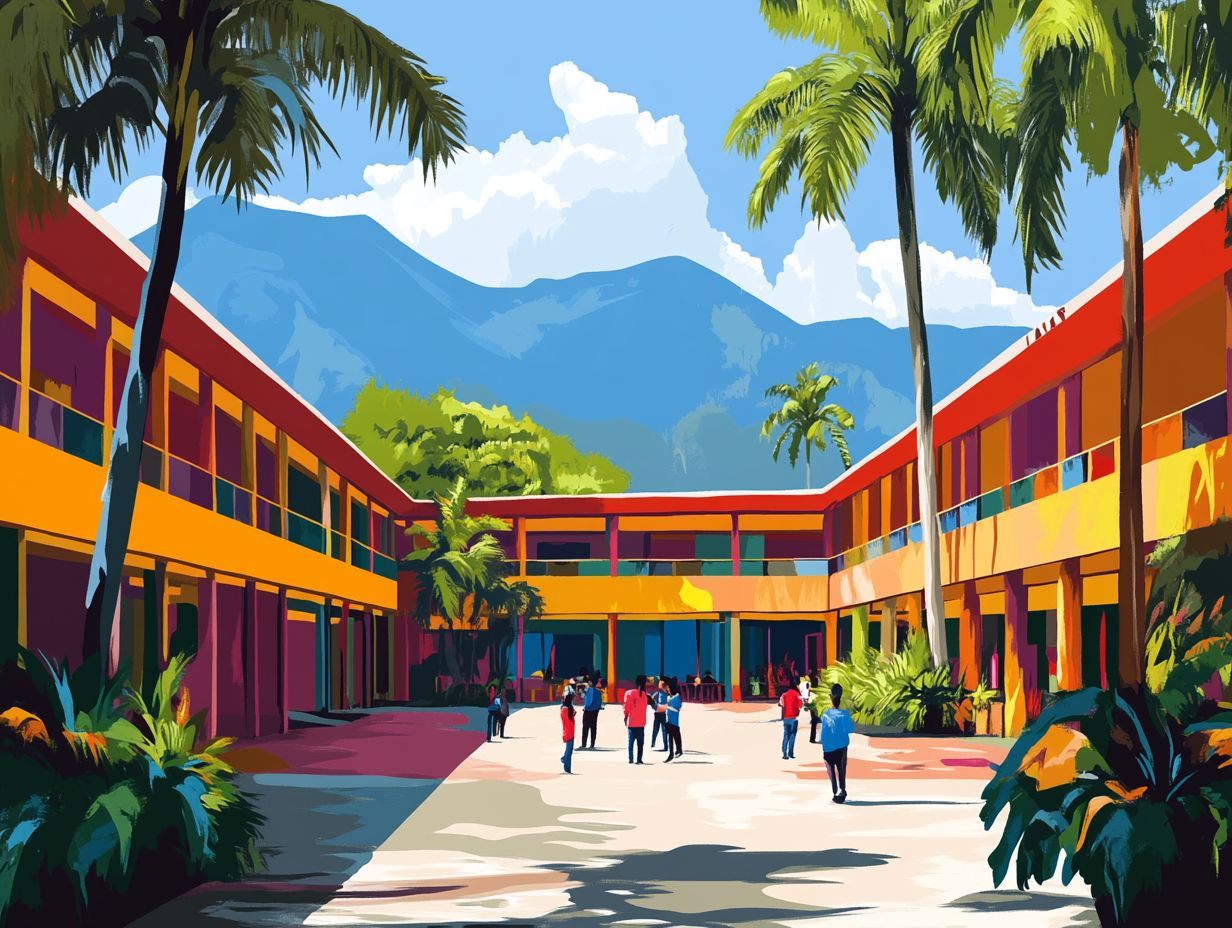
Venezuela boasts a selection of esteemed academic institutions, such as the Central University of Venezuela, University of Zulia, University of Carabobo, and University of the Andes.
These universities offer many programs that will help you succeed in your future career. Their reputation extends beyond national borders, earning recognition in the broader Latin American educational landscape.
Rankings, Programs, and Admission Requirements
The rankings of Venezuelan universities truly reflect their dedication to delivering a quality education. Institutions like the Central University of Venezuela are consistently recognized for their diverse programs and rigorous admission standards, ensuring that you receive an education that aligns perfectly with your career aspirations.
Among the standout offerings, you ll find specialized programs in fields such as engineering, social sciences, and medicine. These programs emphasize practical experiences through internships and research initiatives, giving you a well-rounded education.
Admission requirements can vary. Local students typically need to complete national tests that all students must take, while international applicants must showcase their proficiency in Spanish and provide certified academic records.
Despite facing economic challenges, these universities are innovating by forming partnerships with global institutions, promoting joint research projects, and prioritizing scholarships. This approach sustains academic growth and attracts a diverse student body, creating an enriching environment that benefits everyone.
Cost of Studying in Venezuela
Studying in Venezuela is an exciting journey that involves understanding various costs, including tuition fees, living expenses, and potential financial aid options. These elements are significantly influenced by the prevailing economic challenges and the ever-fluctuating value of the Venezuelan bolivar.
By grasping these costs, you can plan your educational journey with greater precision and effectiveness.
Tuition, Living Expenses, and Financial Aid
Tuition fees in Venezuela can vary greatly depending on the program and institution you choose. Don t forget that living expenses play a crucial role in your overall budgeting for an educational experience. Financial aid options, such as scholarships and grants, are available to support both local and international students.
For example, if you re eyeing a medical program at a prestigious university, be prepared for higher tuition rates compared to humanities courses this reflects the distinct cost structures associated with these fields. Living expenses, which include rent, transportation, and meal plans, can significantly increase your financial burden, especially in urban centers where costs tend to be higher than in smaller towns.
Many institutions offer part-time work opportunities, making it easier to lighten that financial load. The availability of financial aid resources can vary considerably, with some universities providing tailored assistance specifically for international students, effectively broadening access to higher education in Venezuela.
Visa and Immigration Requirements
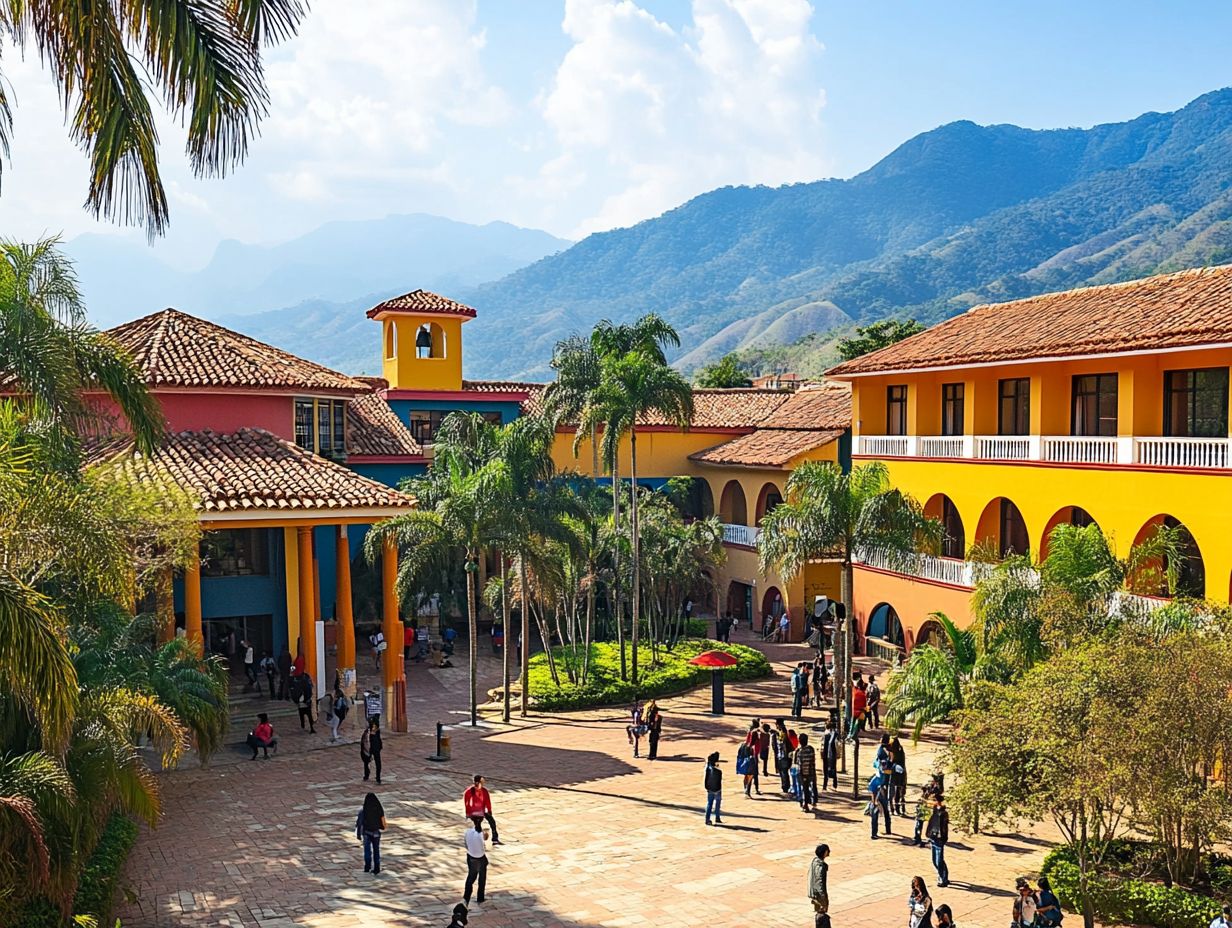
International students seeking to study in Venezuela must adeptly navigate a distinct set of visa and immigration requirements to secure a student visa an essential milestone in their educational pursuits.
By thoroughly understanding this process, you can ensure that your focus remains on your studies, free from unnecessary legal entanglements.
Steps for Obtaining a Student Visa
- Secure acceptance from a Venezuelan educational institution; this is a crucial component of your visa application.
- Compile essential documents, which include a valid passport, proof of financial support, and your academic records.
- Be meticulous when completing the visa application form and pay any required fees.
- In some cases, attend an interview at your local Venezuelan consulate, where immigration officials will assess your eligibility based on the documentation you provide.
Understanding these steps is vital; it will help you avoid delays and ensure a smooth transition into Venezuela s vibrant academic landscape.
Don t miss out on the opportunity to study in a vibrant academic environment! Contact your local Venezuelan consulate today to start your application process!
Cultural Experience in Venezuela
Experiencing the cultural richness of Venezuela is essential for your studies in the country. It provides a unique opportunity to engage with local traditions, savor criollo cuisine, and partake in lively cultural events.
Whether you re captivated by the melodies of the Sim n Bol var Youth Orchestra or exploring the stunning biodiversity of places like Margarita Island, get ready to uncover amazing ways to immerse yourself in Venezuela’s culture!
Exploring the Country and its Traditions
Exploring Venezuela’s rich traditions offers a unique chance to appreciate the country s heritage and stunning natural beauty, from vibrant traditional music to ecological diversity.
You can immerse yourself in local customs through lively festivals and food experiences. Participating in vibrant festivals like La Feria de la Chinita or the Festival de Aguinaldos provides unique insights into folkloric dances and regional rhythms, such as joropo and gaita, showcasing the nation s musical richness.
Engaging in cooking classes focused on iconic dishes like arepas and pabell n will deepen your understanding of Venezuelan gastronomy while encouraging teamwork and cultural exchange.
By connecting with local families and artisans, you ll gain firsthand knowledge that enhances your academic pursuits, fostering personal growth and a broader appreciation for diverse global cultures.
Frequently Asked Questions
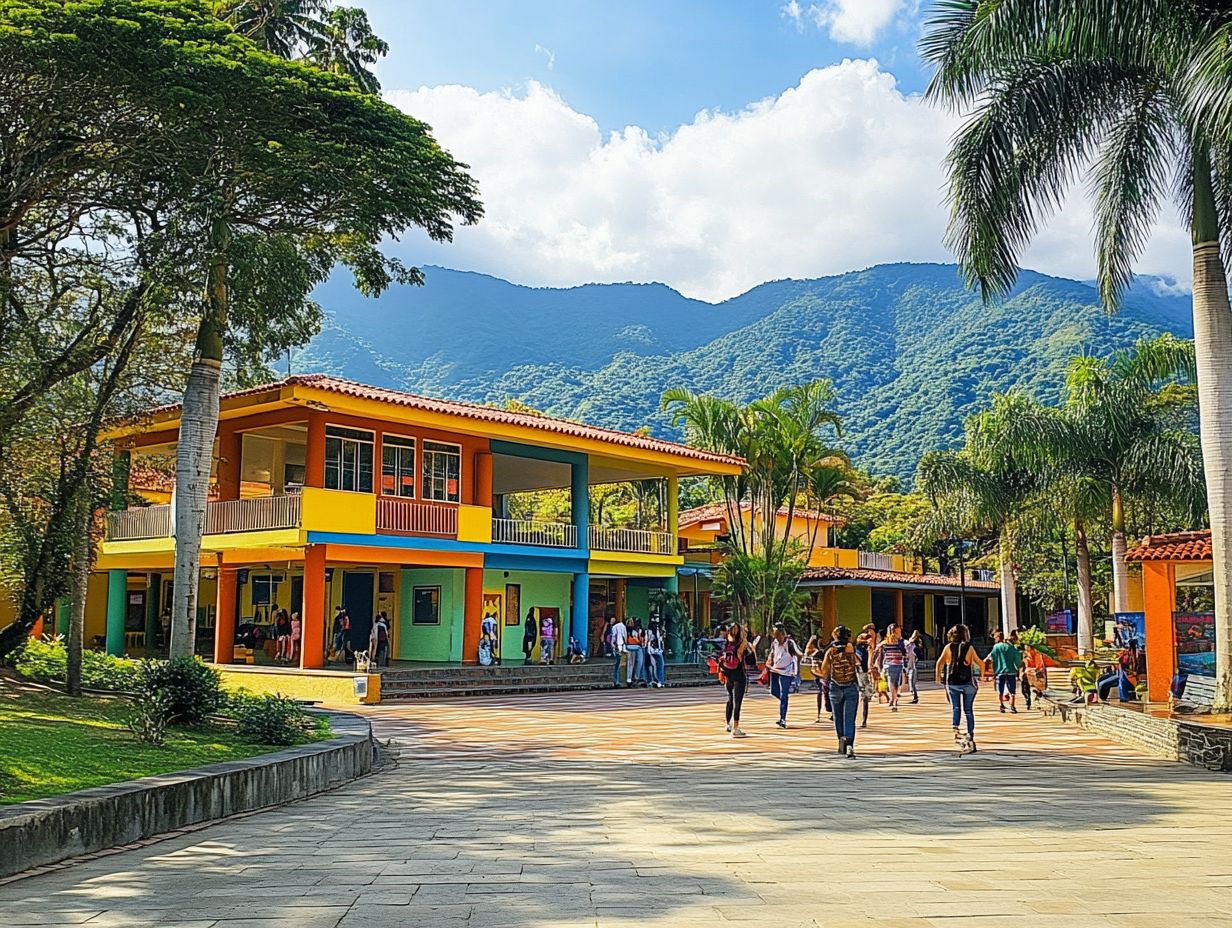
Key Things to Know About Studying in Venezuela
Studying in Venezuela offers a unique experience for international students. Here are some important things to know before embarking on your journey:
What is the education system like in Venezuela?
The education system in Venezuela is highly regarded, focusing on free and accessible education for all. The country has a mix of public and private universities, with most students attending public institutions.
What are the most popular subjects to study in Venezuela?
Some popular subjects for international students in Venezuela include medicine, engineering, and business. However, the country also offers a wide range of programs in the arts, humanities, and social sciences.
What is the cost of studying in Venezuela?
Compared to other countries, studying in Venezuela is relatively affordable. Public universities are free for both domestic and international students, while private universities have lower tuition fees than those in other countries.
What are the language requirements for studying in Venezuela?
The official language of Venezuela is Spanish, so international students are expected to have a good command of the language. Some universities may require proof of Spanish proficiency before admission.
Are there any scholarships available for international students in Venezuela?
Yes, there are scholarship opportunities for international students in Venezuela. Some are offered by the government, while others are provided by individual universities. Be sure to research and apply for these scholarships to help with your financial expenses.
Explore Venezuela’s vibrant culture today!





